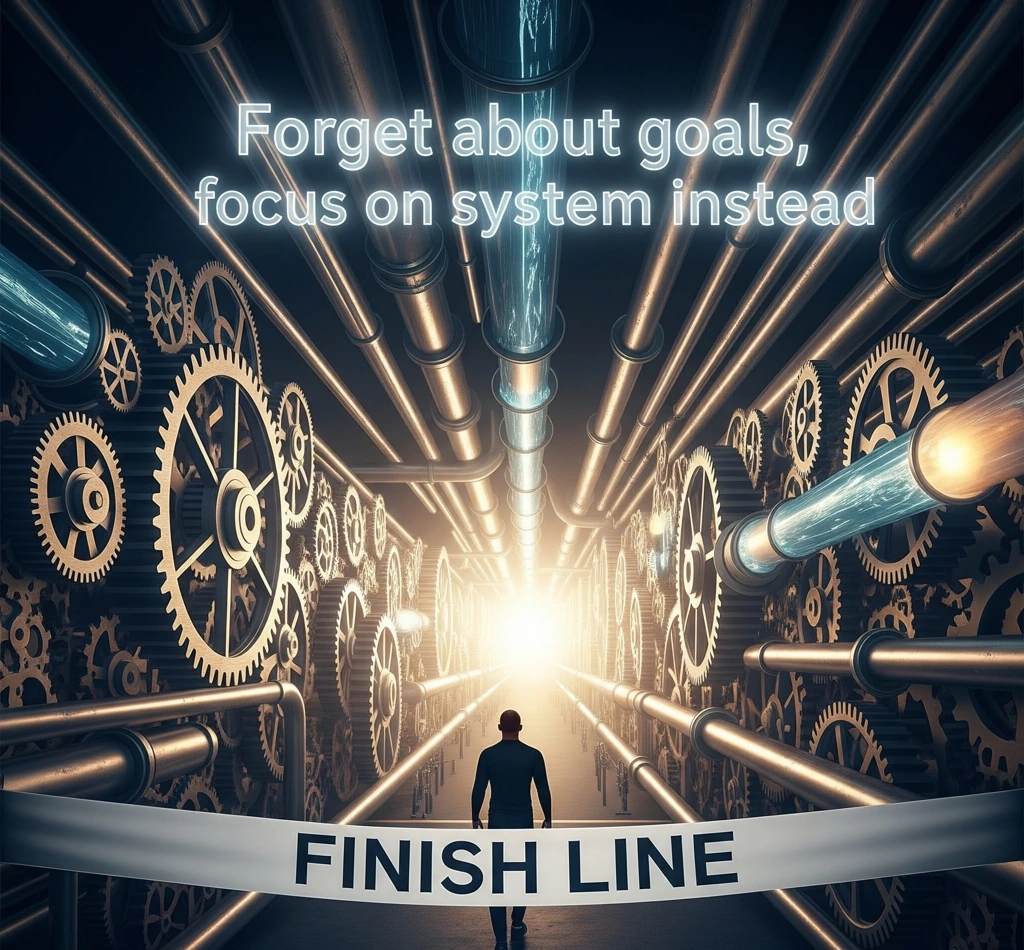Introduction to a Systems-First Mentality
Traditionally, setting goals has been a favored strategy for achieving success across various aspects of life, from personal fitness to entrepreneurial ventures. Yet, the systems-first approach emerges as a powerful alternative, offering a solution to overcome the inherent limitations found in a purely goal-oriented mindset

The Limitations of Goal-Oriented Mindsets
A significant issue with setting goals is their tendency to produce a 'yo-yo' effect. Many diligently pursue their objectives for months, but once they reach their target—be it a fitness milestone or a professional achievement—the motivation dissipates. Without the continuous incentive of the 'race,' individuals often cease their efforts. This focused pursuit of a singular goal can leave one directionless upon its attainment, leading many to revert to their former habits.
Systems vs. Goals: A Comparison
The primary objective of setting goals is to achieve specific victories, whereas the aim of establishing systems is to sustain engagement and participation. Embracing a systems-based approach aligns with true long-term thinking, which transcends individual achievements to focus on perpetual refinement and ongoing enhancement. Success, in this context, is less about singular triumphs and more about your dedication to the process, which becomes the real measure of your progress.
The Effectiveness of a System-Oriented Approach
Goals focus on the outcomes you aspire to reach, whereas systems are concerned with the methods that facilitate these results. For instance, a coach might aim to win a championship; their system encompasses the recruitment strategies, management of assistant coaches, and the structuring of practice sessions. Similarly, an entrepreneur’s goal could be to establish a million-dollar business; their system would involve the mechanisms for testing product ideas, hiring staff, and executing marketing strategies.
Examples of Successful Systems in Various Fields
Reflect on the transformation of a renowned software company that transitioned from rigid quarterly sales targets to prioritizing continuous improvement in customer relations and product innovation. This strategic shift not only heightened customer satisfaction but also fostered sustained revenue growth, showcasing the efficacy of adopting a systems-oriented approach in a corporate setting.
Psychological Basis for Systems over Goals
Psychological research indicates that emphasizing systems over goals can decrease anxiety and enhance job satisfaction. This benefit arises because systems focus on continual progress, reducing the stress associated with meeting specific benchmarks. This approach aligns with our innate desire for learning and development, fostering a more fulfilling work environment.
Tools and Techniques for Building Effective Systems
To implement systems effectively, a clear and structured methodology is essential. Techniques like the PDCA cycle (Plan, Do, Check, Act) empower organizations and individuals to meticulously plan their systems, execute them, monitor their effectiveness, and make necessary adjustments. These tools are crucial for ensuring that systems remain adaptable and are continually optimized for long-term success.
Common Pitfalls in Transitioning from Goals to Systems
Transitioning to a systems-first approach presents challenges. Common pitfalls involve inadequately defining the system, overlooking feedback mechanisms, or not fully committing to the change. To successfully navigate these obstacles, clear communication, patience, and persistence are essential. These elements ensure that the transition is not only smooth but also effective in fostering a sustainable system-focused environment.
The Role of Habit Formation in Systems
Habits form the cornerstone of effective systems. By prioritizing the development of positive habits, both individuals and organizations can secure not only the efficacy but also the sustainability of their systems. The automation of positive behaviors through habit formation diminishes the cognitive effort needed for decision-making, leading to more efficient operations and enhanced focus on continuous improvement.
Future Trends in Systems Thinking
Looking ahead, the integration of systems thinking with technology is expected to deepen. Advanced tools like artificial intelligence (AI) and machine learning are poised to revolutionize how systems operate by predicting outcomes and automating adjustments. This technological enhancement will make systems more dynamic and responsive, enabling them to adapt to changes in real-time effectively.
Conclusion: Embrace the Process
In conclusion, shift your focus from goals to systems. Adopting a systems-first mentality acts as a remedy for the shortcomings of a goal-oriented mindset. By valuing the process over the product, you can achieve satisfaction whenever your system is operational. Moreover, a well-designed system can lead to success in numerous ways, not limited to the initial vision you had in mind. This flexibility and ongoing engagement are key to lasting achievement and personal fulfillment.